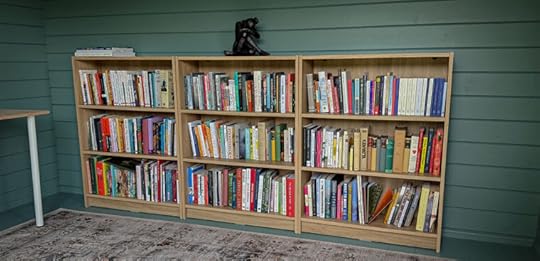The Case For Physical Media

The architect wanted to show me a house he had built. It had some ideas similar to some he had suggested for the mountain lodge I was wanting him to design. I walked in ready to look at kitchen and bathroom features. But what captured my attention was the vast lounge room.
Every wall was filled with expansive floor-to-ceiling bookcases. They were stacked with old books. Mostly novels and poetry and history. And vinyl. Lots and lots of vinyl. “Yes, he collects,” the architect said. But this felt less like a personal collection than some kind of treasure trove. A mirror held up to 20th-century Japanese culture.
There were a couple of sofas, a few more reading chairs, some side and coffee tables, a floor lamp, and a big dining table. But those vast bookcases and the high raked ceiling made this feel like more than just a living room. This was a place in which to live, in the fullest sense of the word. In which to flourish. A space that rewarded reading and listening patiently.
I still buy books. Physical books. Maybe too many books. Over the years I’ve had people look at my bookcases and ask, “Have you read all those books?” That really isn’t the point. You buy books in order to always have something to read. Not as tokens of having already read.
I also buy vinyl. And occasionally CDs, when vinyl isn’t an option. Lately, I’ve started buying DVDs and Blu-rays again.
This isn’t some kind of anti-streaming stance. I like Apple Music and Apple Music Classical. There are aspects of streaming for TV and film that I enjoy. Convenience and portability are things I appreciate.
But I wonder how sustainable these digital services are.
Streaming is costly. And the prices for these streaming services rise in ways untethered from how our income increases. Will they even be affordable in the future? Will they still stream the things we want? How many different services will we need to sign up for? And how useable will they be?
My father had to “upgrade” his cable service box recently. For his age, he’s very good with technology. To watch him struggle with a poorly designed menu system was painful. And there doesn’t appear to be any way to make the interface easier to navigate. There are no accessibility settings. The whole thing is actively hostile to any user who has less than perfect vision or lacks sharp reflexes.
I imagine myself in my 80s or 90s. I like to think I’d still want to watch the best new films. But I probably wouldn’t care much if I saw them months after they came out. What’s the rush? I’d love to still be reading every day. But I’ll probably be on fewer flights, or waiting less often in distant places, and so I might not need a library in my pocket like digital devices promise to be.
I’m not quitting digital streaming services. At least not now. Maybe I never will. But I’ve decided not to go all in on them either. I’m relying on them less and less. And enjoying the freedom that comes with that. I like that I can read a book, listen to music, or watch a film without worrying about what my password is or whether my payment details are up to date.
I also love that some Silicon Valley company can’t take away my access to the physical media I have on my shelves. Or edit their content to suit current political trends in a country I don’t even live in.
The life of the mind is an expression of freedom I want to hold onto.
From time to time, I think about that house with the vast bookcases. Sometimes I drive past it when I’m back in the Japanese Alps. I like to reconnect with the sense of awe I felt the first time I saw that lounge room. It was a vision of an ideal way to live. Made real in physical form. As I get older, it’s an increasingly appealing vision.
The post The Case For Physical Media appeared first on Fernando Gros.



